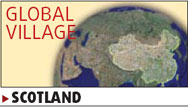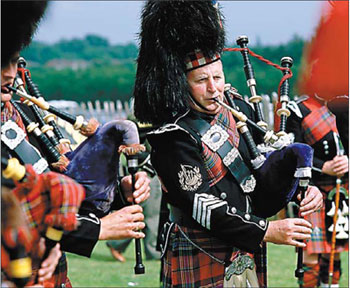Giving a hoot about land of the brave
Scots around the world are recovering from last week's Tartan Day celebrations in which thousands of proud expats remembered their roots and let go a few hoots.
For a small nation of 5 million people, Scottish cultural icons, such as whisky, golf, kilts and bagpipes, are recognizable all over.

Many Chinese students are now flocking to their universities, and an increasing number of Chinese tourists are discovering the beauty of the Scottish Highlands since the European nation scored tourist status.
Scotland was originally the name given to Ireland. Scotia, the Latin word meaning "land of the Gaels", eventually modulated into Scotland and after the Middle Ages the name stuck to the small country.
Historically, Scotland has been a nation continuously at war. From the time of the Roman invasion and occupation to the union of England and Scotland after the Stuart dynasty, Scotland has been in a continuous limbo stage of war and peace. The Scottish Enlightenment and industrial revolution paved the way for a modern Scotland.
The enlightenment's chief virtues were unlike the rest of Europe due to the country's unique demographics, and had a great impact all over the world. Scotland suffered a particularly strong manufacturing decline in the mid-20th century.
The country has since rebounded with a strong economy bolstered by its financial services industry, exportation of natural resources from the North Sea, and through a booming electronics industry.
Edinburgh and Glasgow, the nation's two largest cities, are currently among the largest economic centers in Europe. They are also famed around the world for their festivals and rich culture and together attract tens of millions of tourists each year.
Many are Chinese golfing enthusiasts who are eager to visit the home of golf.
|
Bagpipes are a Scottish institution recognizable around the world. Quanjing |
Sino-Scottish relations have been active for more than two centuries and Scottish botanists were among the first to visit.
Now Scotland wants to increase the flow of ideas between the two countries and allow Sino-Scottish relations to flourish. Target areas are business and education, with a call for increased tourism and collaborative science projects. Scotland hopes to attract skilled Chinese.
Scotland education authorities also plan to have at least 200 Scottish students studying for Chinese national language qualifications by 2010.
During a recent visit to Beijing, Scotland's former First Minister Jack McConnell was in China promoting what he said were Scotland's finest assets such as golf, whisky and financial services.
"China is a fantastic place and I fell in love with it when I was last here. The people are extremely friendly and remind me of Scots," McConnell said.
Trevor Nichols
(China Daily 04/11/2008 page19)















